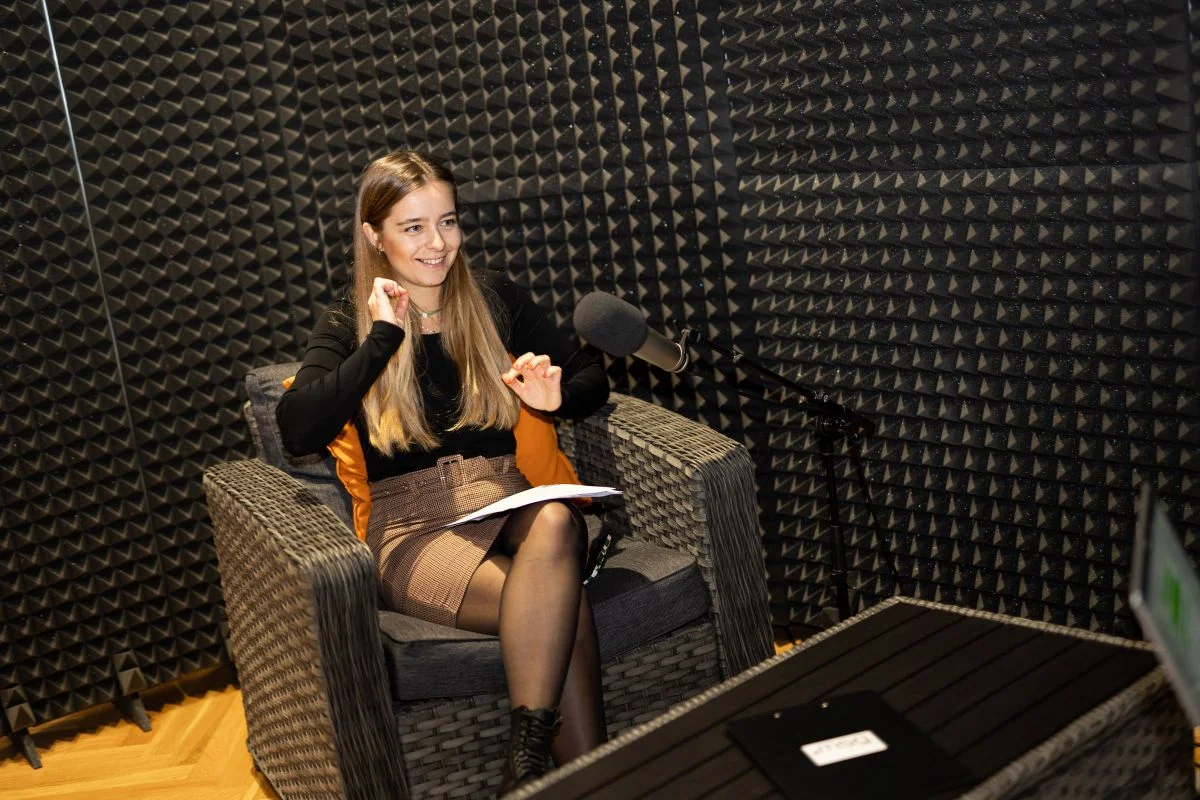Podcast #5: Working from home and its impact on wellbeing
The ability to work from home is one of the essential benefits of any modern company. However, this way of working brings us not only many advantages, but also challenges. Our guest in today’s podcast is psychologist Dominika Neprasova from the online platform Ksebe.sk.

The pandemic has changed the way we work. What was impossible before it has become commonplace – many at work started and still work in home office mode. On the one hand, this way of working gives us some flexibility, but on the other hand, it can have a significant impact on our health, productivity and overall wellbeing.
That’s why today we’ll be looking at both the benefits and challenges of working from home, and we’ll also be looking at ways to keep yourself physically and mentally healthy, whether you work in the IT world or anywhere else. Listen in to the episode titled Working from home and its impact on wellbeing with our HR manager Ivana Hricova or read the transcript.
Dominika, how do people manage to work from home? Aren’t we getting lazy?
Since the pandemic, working from home has been a highly debated topic not only in the world of human resources, but also in general. Are we becoming lazy? I’ll answer that simply. Those who want to get lazy, let them get lazy. Those who don’t want to get lazy can work efficiently and productively from home. There are certainly some specifics, advantages, disadvantages. But I’m forging the path of the happy medium, and I bring a certain relativism to this topic, as well as to our podcast today.
Do you think working from home will become more and more common? Or are we due for a return to the office? How are employers approaching this?
When I was still working in HR, there were still companies that were staying at home on remote or starting to create a hybrid working model. There were also companies that went back to a traditional office working model right away. But there were also companies that forced employees to go to the office even during a pandemic, which was perhaps even life-threatening.
How a company goes about this is its own decision. But the times are moving forward, and from the perspective of Generation Z, but also overall, the music of the future is definitely remote, or at least a hybrid working model. Because it wasn’t entirely comfortable for people to have to go to the office after spending time at home. I think the hybrid is the answer – that trend is really strongly at the forefront.
When I was hiring, I did it for other locations in Europe, not only for Slovakia. If I told the candidates that they couldn’t work from home, the work was not interesting for them at all. So also from a recruiting point of view, I know that people want to have flexibility and they want to be able to at least choose when they are in the office and when they are at home or in a coworking space.
Working from home provides us with both opportunities and unexpected complications. How do I find out what really benefits me and what exhausts me? What do you think is the biggest benefit of working from home?
In order for us to find out how we are doing, we should observe ourselves and find out what works for us, when we feel like it. Some people know exactly, others need to do more digging to find out what and how affects their wellbeing.
In my opinion, there are several advantages of working from home. The first is time-saving – we don’t have to move around, which also makes it a greener alternative. Plus, there are so many stimuli influencing us nowadays that we are overstimulated. When we are at home in our comfortable environment, there are fewer stimuli. Because we’re not on a tram or a bus, we don’t have to make small talk with anyone, etc.
At the same time, there is a degree of flexibility. If we have meetings that we all have to be at, the early birds can get up as early as 6:30, start work and then finish early. Conversely, someone might prefer to sleep longer because they don’t have to travel and start work later.
From a psychological point of view, we also develop skills that we might not have developed in that office environment – our own time management, setting boundaries, independence. These are all things we need to learn so that we don’t get lazy, so that our productivity and efficiency doesn’t drop. It is a challenge for us.
A lot of research says we’re more productive at home because even if we’re doing laundry or washing dishes, it’s still a shorter time than going out for lunch, coffee, a cigarette – we’re a little sleepy after lunch, so we slow down… These scales are equivalent – we want to socialize in the office, and that takes away from our time and it takes away from our efficiency.

These were the biggest advantages of working from home. What are its pitfalls?
From my point of view, social isolation is a big issue. We don’t have direct face-to-face contact with colleagues, we only have virtual contact. Then there are the technological challenges of making meetings work, of making ourselves heard, of having good internet. Because the technical challenges reduce the effectiveness. If somebody is doing a remote, for example in Bali, we have to reckon with time delays.
Then it’s also such a personal test of resolve – if we can stand up from Netflix and stop at two episodes and not continue on for three more. Those are the kind of personal skills that are nice to develop.
From a managerial point of view, it’s definitely a control of work – how employees are meeting KPIs, how to set goals and overall collaboration when everything is done virtually. And ultimately, it can also be a stereotype when we’re always at home, in the same room. Depending on our personalities, we respond better or worse to the stereotype.
Why is the feeling of isolation so strong when working from home, even though we have technology that supposedly connects us?
Because a screen will always be a screen and physical contact will always be physical contact. Even small talk, which may not make sense to introverted IT people, is important. We meet people in the kitchen or other common areas, we can consult problems, play table football, ping-pong, whatever. We need to be around people psychologically and professionally. It’s always easier to go to someone with a question than to type it into a chat and wait for an answer. Physical contact is dominant and is very important to us.
IT professionals were among the first to make the big switch to the home office. However, working in this sector often requires constant availability and coping with demanding deadlines. How does this affect their wellbeing and how do IT professionals cope?
There is very often just the theme of healthy boundaries – to be aware of when to turn off the computer, when they may not be available. There is also a theme of technology fatigue per se. Computers, monitors, screens and blue light make us tired in general. And when you add on top of that the mental work that developers have, it’s a huge package.
It’s also always about the fact that each of us is different and has different predispositions. Someone is energized by the amount of work, another is very tired. It depends on the individual person, how they cope with it. Someone needs frequent breaks, someone will pump up the work and then quit early so they can rest. A lot of it has to do with who is what and how they need what.
Do a lot of people come to your therapy sessions with the problem of digital fatigue?
Digital fatigue, in my opinion, exists both in the office and in working from home. The question is which environment is easier to manage. I would say – but this is purely my subjective view – that it is easier to manage at home because we don’t have other stimuli influencing us there (colleagues, turmoil, etc.).
But digital fatigue is a big separate topic that we need to learn to work with, for example in therapy with a coach. It’s also very important to talk about it in an HR context.
What techniques would you advise IT people to switch off and find their lost balance? Can you recommend any tools that can promote wellbeing when working from home?
Too much of everything is harmful. The more different tools we have, the more complicated it gets. I see the way out in simple things. When I’m overworked and need a break, I turn off my computer and phone and do something else, the work can wait for me until tomorrow. If it’s very urgent, I can get back to it.
With digital fatigue, movement and being outdoors go hand in hand. You need to be physically involved in your work. Especially for IT specialists who sit a lot, hunched over, staring at displays, short breaks are extremely important. You need to get some air, even if it’s only for 10 minutes. That refresh can not so much reduce fatigue, but better manage it psychologically and physiologically. Otherwise it will manifest itself in health problems, migraines and so on.
What steps can we take to protect ourselves mentally when working from home? Can you recommend any tricks or classic routines?
When we worked from home during the pandemic, my friend had a routine of getting up, changing, making her bed, making coffee, and sitting down at her computer. This was her way of trying to avoid the laziness of being at home but having to work. She created something of her own.
And that’s what I think is best – when everyone creates something that works best for them. Because we know ourselves best, we know where our limits are, our strengths, what works for us. There are a lot of those routines. They’re to-do lists, for example. I know people who normally get dressed for work at home in the clothes they would be in at the office, put on makeup, groom themselves. Even when they’re at home, they’re just at work. And when work is over, they put on sweatpants and do other things.
In my opinion, the best routine or the best trick is to take care of yourself. Whatever that means to you. It can be a good meal, a tea break, a walk, a morning workout or something else. We have to find what works for us. General advice and tips are fine, but when people read them they can get frustrated because they can’t put them into context. That’s why I don’t like to give tips either, they’re more like inspirations. I can tell you what helps me, and you can try to analyze it and figure out what helps you.
How can we better cope with the feeling of isolation if we only work remotely?
If the company has the capacity or budget or other possibilities, it is very nice to go to the offline world. To meet, for example, once a week or once a month, to go somewhere out, so that we are not just behind those displays. It’s very good if the company culture or the HR department supports that.
At the same time, if IT specialists work completely remote and have colleagues only in India, for example, they can also socialise with people from their own environment, not just with colleagues. We also have other people around us – family, friends… For someone, it’s still nice to have that contact just in the online space, which is not a bad thing if it’s okay for them. Everyone has to deal with their situation in a way that suits them.
Dominika, do you have any examples or personal experiences with people who have managed to set healthy boundaries and improve their well-being when working from home?
I think my personal experience is the most telling. I was able to get my work from home to a level where the work was done, I was productive and efficient. My life changed 180 degrees because I had time to myself, a tidy household, I started running, I was training for a half marathon… It just suited me, I had no boundary issues.
Maybe it’s about decisions, about consciously setting when to turn off the computer. I learned how to function that way, it was completely comfortable for me and I got a lot out of that period. But all the things we talked about – social isolation, laziness, routines, rituals – all of those things I had to laboriously set up and learn.
But I liked it very much. I felt like I could do five times more work at home than in the office. I’m quite a social person and when I was in the office I wanted to have fun with everyone. But I didn’t feel socially isolated at home either. I always had colleagues on the phone or on online chat platforms. And the people I wanted to be with were after work. I was able to set a boundary and go for a walk, run, skate with them after work… I was able to incorporate exercise into my life because travel was cut short and I had already done two laps around the lake instead.

Can you share with us a specific real-life example of how someone managed to transform working from home into something that really empowered them mentally?
Not entirely out of practice, but my mom’s examples come to mind. The important thing about working from home is time – what we do with it, how we use it. She realized that this time can be devoted to many things, not just work. That she can do her work and then devote herself to the activities she likes. She started going to different clubs and doing different activities.
It is up to us how we choose to deal with time. I think we can use every situation to our advantage. As well as we can do that, we will be successful.
What would be your advice to our listeners?
If they were my clients in a therapy room, I would tell them that work is just work. Also think about what other things can make your life better and happier.
If I were in an HR position again, I would ask the staff how they need it. Or what they would need to go through, set up. And I would trust them to know what’s better for them – whether to be at home, hybrid mode, remote or be in the office. I would try to actively broach the subject with them, because I think it’s very beneficial to analyze yourself. It will give us a lot of answers to what works for us. The key is to be kind to myself, to find my way to myself and figure out where I feel comfortable and where I don’t feel comfortable. But work is just still work. We have to do it wherever we are, but it’s still work.
Last question – what trends do you see with employers who offer work from home? Will employers help employees in this sphere?
I think it’s going to be about management setup and company culture. There will remain firms that will have an office-only model, firms that will be hybrid and also firms that will be maybe only remote or mostly remote.
It depends on the recruiter’s needs. There are positions that we cannot fill in the regions and it is worth thinking whether we can fill them in other European cities and give the job to remote recruiters. This is a wide-ranging issue that affects several sectors. But it’s all about the set-up of the company – whether it trusts the employees, whether it sets an example for them.
Thank you Dominika for today’s interview. I hope that you, dear listeners, have learned something new and practical that will help you to manage working from home in a way that is conducive to your mental health. Dominika Neprasova was in the studio with us today. I am Ivana Hricova from msg life Slovakia and until next time, goodbye.
